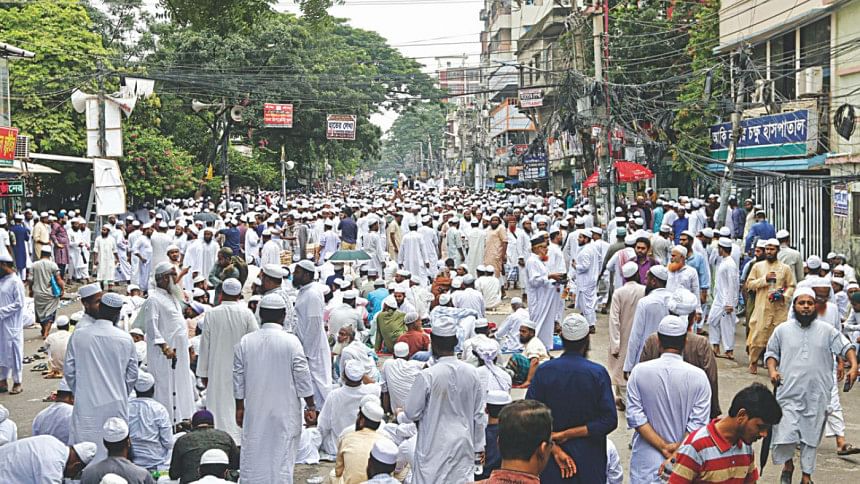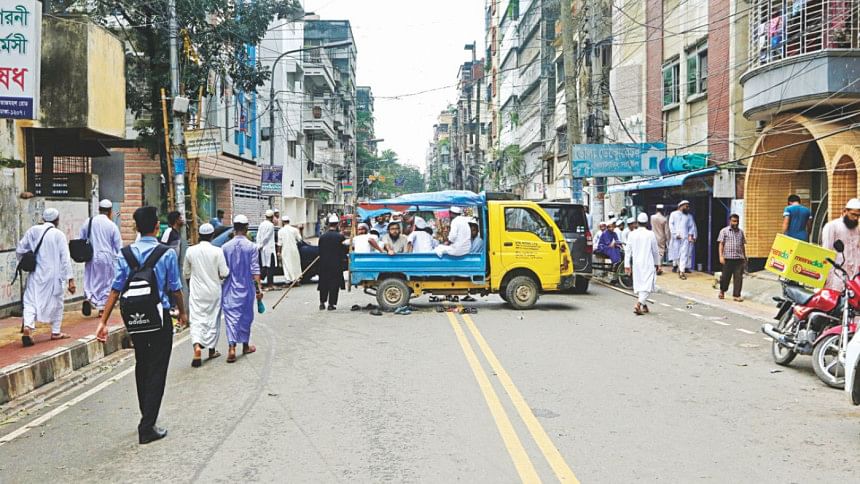Hefajat involves itself in Tabligh affairs

Hefajat-e-Islam's influence on a Tabligh Jamaat faction has become evident with the Hefajat chief attending a rally of the faction for the first time in the capital yesterday.
In the presence of Hefajat chief Maulana Shah Ahmed Shafi, the faction decided to prevent Tabligh Jamaat's top leader and Indian Islamic scholar Maulana Saad Kandhalvi from giving sermons in Bangladesh.
Shafi, the top leader of the Chittagong-based Islamist outfit, agreed on the six decisions made at the rally attended by thousands of followers of the Tabligh Jamaat faction and Hefajat that oppose Saad.
However, none of the 11 Shura members of Tabligh Jamaat, a non-political Islamic group, attended yesterday's rally.
Saad, who had conducted Akheri Munajat (concluding prayers) of the Biswa Ijtema at Tongi for three consecutive years since 2015, had to return to New Delhi without joining the congregation this year in the face of protests over his alleged controversial statements for which he later apologised.
The Tabligh Jamaat faction claimed that Saad took the title of Ameer by himself going against the Sharia, and said it would not let him give any sermons in Bangladesh.
The rally which began around 9:00am at Mohammadpur Eidgah caused traffic chaos on the roads around the venue. It ended around 1:00pm.
In his speech at the rally, Shafi, also chairman of Qawmi Madrasa Education Board, said no “new Tabligh Jamaat” would be tolerated.
“You should fan out across villages so that none can launch a new Tabligh. Ulema should join Tabligh even if they have to shut madrasas for this ...,” said Shafi.
According to one of the six decisions, no member or group of Tabligh Jamaat will travel to Nizamuddin in India to attend religious programmes, and no one of Tabligh Jamaat there will be allowed to attend programmes in Bangladesh.
The faction also asked Tabligh Jamaat members to disobey those Shura members -- based in the capital's Kakrail Mosque -- who follow Saad.
It said Tabligh Jamaat would be run in line with the teachings of three murubbis (leaders) -- Maulana Ilyas, Maulana Yusuf and Maulana Inamul Hasan.
These instructions have to be followed in carrying out all the activities at Kakrail, Tongi Maidan and in districts, read one of the decisions.
In another decision, the faction said those Shura members who follow Saad have lost the eligibility to remain in the posts.
At the rally, Shafi said, “Ulema made the decisions on the basis of fatwa [religious edict] by Darul Uloom Deoband. Tabligh [Jamaat] will follow the teachings of the three murubbis [leaders] till the judgement day.”

The faction thanked Home Minister Asaduzzaman Khan and Awami League lawmaker Jahangir Kabir Nanak for facilitating the rally.
Founded by Maulana Ilyas Kandhalvi in India in 1927, Tabligh Jamaat, a non-political global religious movement, now has an estimated 70 to 80 million followers in more than 150 countries, majority of whom are based in South Asia.
All the decisions regarding Ijtema and selection of Shura members are made after consultations with the organisation's headquarters in Nizamuddin of New Delhi, according to sources at Kakrail mosque, considered the headquarters of Tabligh Jamaat in Bangladesh.
Saad had played a key role in these affairs in the past. But this year has been an exception as the Shura members in India and Bangladesh have become sharply divided over Saad's alleged controversial statements.
Though there has been a rift in Tabligh leadership in India for the last two years, no such conflict occurred in Bangladesh until Hefajat's protests in January this year.
The conflict between the two factions of Tabligh Jamaat in Bangladesh surfaced at the last Biswa Ijtema, the second largest Muslim congregation after the hajj.
Since then, the two sides clashed at least four times over Saad's statements as well as establishing supremacy at Kakrail mosque. Police were deployed at the mosque as tension ran high.
Later, the home minister mediated between the two factions to resolve the feud.
According to the mosque sources, there are 11 Shura members. Of them, six support Saad and five oppose him.
In the past, Saad used to hold meetings with the Shura members in Bangladesh every year to decide on various issues. But this year, some of the Sura members declined to meet him when he came to Bangladesh to attend the Tabligh Jamaat in January, said the sources.
PUBLIC SUFFERINGS
The residents of Mohammadpur and its adjoining areas suffered due to long tailbacks as more than 20,000 members of Hefajat and the Tabligh faction gathered at the venue adjacent to Tajmahal Road.
Traffic movement was disrupted on Tajmahal and Noorjahan roads, and also on the streets and alleys around the Town Hall and Mohammadpur bus stand. Rain worsened the situation.
Loudspeakers were set up at nearby mosques, intersections and on different roads to relay the speeches of the participants, said witnesses.
Students and office-goers were the worst sufferers. Failing to find any transport, many of them started walking to their destinations.
Contacted, Biplob Kumar Sarkar, deputy commissioner (Tejgaon Division) of Dhaka Metropolitan Police, said the organisers verbally sought permission from police to hold the rally but did not submit any written application.
Asked why police permitted holding the rally in a residential area, the DC said, “Every area in Bangladesh is a residential area.”
About people's sufferings, he said the locals faced problems as the rally was huge.

 For all latest news, follow The Daily Star's Google News channel.
For all latest news, follow The Daily Star's Google News channel. 





Comments